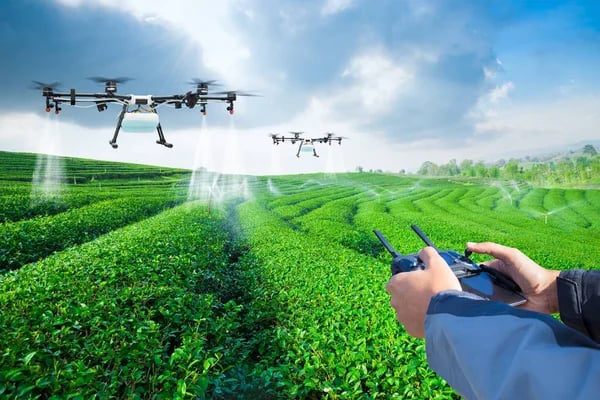Smart Farming
The Revolution of Smart Farming.
Preeti Sinha
9/26/20233 min read


In the heartlands of rural America and around the world, a silent revolution is unfolding on farms. Gone are the days of lone farmers working tirelessly under the blazing sun. Instead, technology has introduced the era of smart farming, where innovation intersects with agriculture. Smart farming isn't just about cultivating crops; it's about cultivating them intelligently, efficiently, and with a sharp focus on sustainability. In this article, we'll delve into the marvels of smart farming in straightforward language.
Understanding Smart Farming
Smart farming, also called precision agriculture, represents a contemporary approach to farming that leverages technology to enhance agricultural processes' efficiency and sustainability. It involves incorporating diverse technologies such as sensors, drones, GPS, and data analysis to optimize every facet of farming, from planting and watering to harvesting and pest control.
1. The Wonders of Sensors
Imagine having a small, clever assistant in your field, constantly monitoring soil conditions, temperature, humidity, and even your crop's health, day and night. This is precisely what sensors accomplish on smart farms. They gather data and transmit it to computers or smartphones, empowering farmers to make well-informed decisions. For instance, when soil moisture levels dip too low, a smart farmer receives an alert and knows it's time to water the crops, preventing wastage and conserving resources.
2. Drones - The Sky's Watchful Eye
Drones serve as the farmer's eyes in the sky. They can soar above vast fields, capturing images and data that would take humans days to collect. Drones can detect problematic areas in the crop, monitor plant health, and even assist with seeding and pesticide application. This not only saves time but also enables precise interventions, minimizing the need for excessive chemicals and water.
3. GPS and Precise Planting
No more guesswork when it comes to planting crops. Thanks to GPS technology, farmers can meticulously map out their fields and plant seeds with exceptional accuracy. This reduces seed wastage and ensures that every square inch of the field is utilized effectively.
4. Data Analysis and Informed Choices
All the data gathered by sensors, drones, and GPS devices would be futile without astute analysis. This is where data analytics comes into play. Powerful computers process the data and provide insights to farmers. For instance, they can predict when diseases might strike, enabling farmers to take preventative measures or advising on the best time to harvest for optimal yield and quality.
5. Resource Management, Particularly Water
Water is a precious resource, and smart farming aids in its conservation. By monitoring soil moisture levels and weather conditions, farmers can apply just the right amount of water, cutting down on waste and environmental impact. Likewise, resource management extends to other areas, such as using fewer pesticides and fertilizers, thus promoting more sustainable farming.
6. Enhanced Livestock Care
Smart farming isn't restricted to crops; it extends to livestock as well. Sensors can monitor the health and behavior of animals, ensuring they receive proper care. For example, if a cow falls ill, a sensor can alert the farmer, enabling swift action.
7. Sustainable Farming for a Brighter Tomorrow
One of the most remarkable aspects of smart farming is its sustainability. By optimizing resources and minimizing waste, smart farming contributes to environmental protection and ensures that farming remains viable for generations to come. It's a win-win situation, benefiting both farmers and the planet.
To sum up
Smart farming represents the farming of the future, but it's happening right now. With technology's assistance, farmers are becoming more efficient, productive, and environmentally conscious. The wonders of smart farming lie in its capacity to harness the potential of data and innovation to feed a growing global population while safeguarding our planet. So, the next time you savor a farm-fresh meal, remember that there's a touch of technological marvel behind it, making our food smarter and more sustainable.
